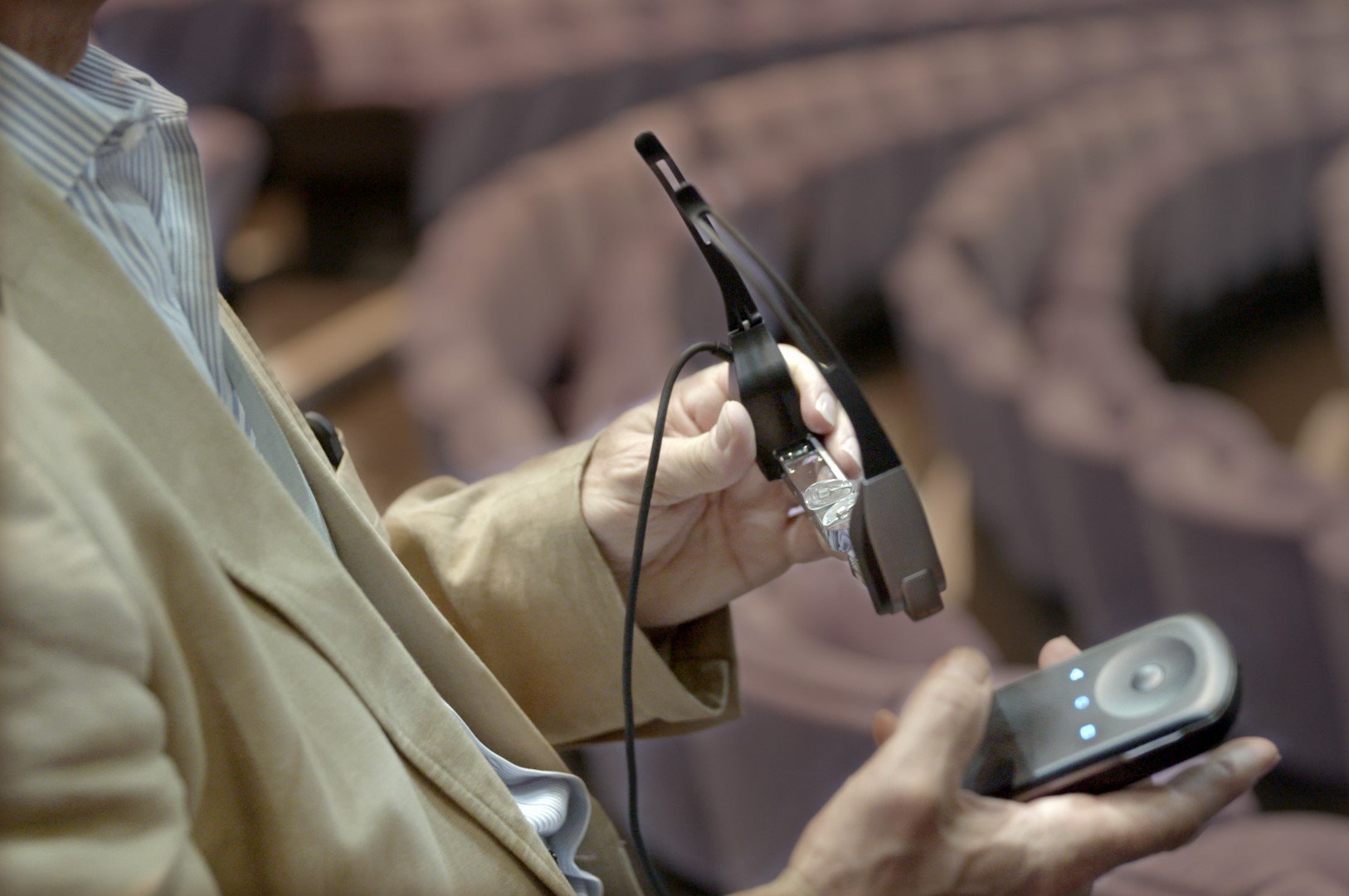
Open access smart capture glasses
Photo: Cameron Slater
Theatre accessibility for hearing aid users
The National’s Head of Access David Bellwood explains how the theatre prioritises accessibility, working with manufacturers and deploying the latest technology to ensure the best possible experience for theatregoers with hearing loss.
When it comes to accessibility for theatre users, the National Theatre is at the top of its game. Accessibility options for those with hearing loss or deafness are notoriously difficult at theatres in the UK.
From poor sound quality to varying levels of staff deaf awareness, unreliable booking systems, and interference issues, hearing instrument users often face a major anticlimax when going to the theatre.
We are committed to providing an excellent experience for anyone visiting the theatre, no matter their circumstances, a position that is supported by the British and Irish Hearing Instrument Manufacturers Association (BIHIMA), which works to raise awareness of issues for people living with hearing loss.
Access for hearing aid users
The National Theatre has a core aim: to be welcoming and accessible to all. Through a programme of assisted performances, accessibility devices and adjustments at its South Bank home, we strive to meet the requirements of deaf, disabled and neurodivergent people, as well as those with requirements due to physical or mental health conditions.
We do this through a combination of producing shows that are free from barriers or, when this isn’t possible, identifying and removing those barriers. With this in mind, we have created an unparalleled selection of assistive systems and a thorough access scheme.
We are always striving to broaden and improve accessibility. Our commitment is focused on the Social Model of Disability, which prioritises listening to audience feedback to ensure adjustments are what people actually need, not just what we think they might need. We aim to ensure everyone feels welcome and comfortable with talking to us about what support they need here.
And the proof is evident. Consistent feedback from theatre users shows the National is achieving its aim, enabling seamless performance experiences for those with additional needs.
Assistive systems
The National Theatre boasts a selection of different options for visitors with hearing loss or deafness. These include: hearing enhancement headsets, hearing loop system, smart caption glasses as well as captioned performances.
Our hearing enhancement headsets use an infrared system: Williams AV headsets. These headsets came into use after a tender process following a previous partnership with Sennheiser. The headsets are easy to operate, reliable, flexible, and have excellent clarity. We have not found another headset as good as this in terms of sound quality. This matters because we want the users to experience the best of the best.
Similarly, the loop system needs to meet considerations of reliability, technical limitations and delivery to every seat. Due to the historic nature of the theatre building, there were limitations to how the loop system could remain adaptable and durable, while still providing excellent coverage. The answer was to install the system under the carpets.
It’s a fine balance between the limitations of our listed buildings, installing systems that aren’t too visible – while not jeopardising the quality of sound. Luckily, we have lots of problem solvers to find the right solutions.
Keeping up with technology
The expertise of the National’s sound engineers, producers, and composers helps us excel in our approach to accessibility. They participate in technical rehearsals to fine-tune the systems for those using hearing enhancements. Hearing accessibility is planned from the outset of production rather than added as an afterthought.
But hearing instruments are constantly changing, so we have to stay up to date with the latest technology. You may put a brilliant system in place one year, but the technology will overtake it and the two will no longer be compatible. So, both education and maintenance are so important.
All Front of House and Box Office staff are aware of relevant information for those in need of our assistive systems, as well as of what is available for each theatre and production. And most customer-facing staff are trained in the use of the equipment.
Striving for solutions
Deaf, disabled and neurodivergent visitors are invited to join our Access scheme so we can better meet their requirements. Those signed up receive information on any upcoming access performance, have early booking for access tickets and receive adjusted seat prices for themselves and a companion.
We want to make sure we cover all possibilities. It’s vital that we are accountable for any barriers we do create – it’s something we are always open about. We run consultations with those living with disabilities, strive to seek creative solutions and keep track of production reports and feedback on access issues. All this is brought together to make changes whenever necessary.
The Chairman of BIHIMA, Paul Surridge, has endorsed our work: “It’s fantastic to see the National Theatre’s unique and purposeful approach to access for those with hearing loss. It is clearly far more than a tick-box activity, which, sadly, we do see in many theatres.
“In our bid to encourage a collective agreement to drive positive change in the industry, we believe the National Theatre has set an excellent standard that all theatregoers with hearing loss should be able to expect.”
David Bellwood is Head of Access at the National Theatre.
![]() www.nationaltheatre.org.uk/your-visit/access/ | bihima.com/
www.nationaltheatre.org.uk/your-visit/access/ | bihima.com/
![]() @NationalTheatre | @BIHIMAssoc
@NationalTheatre | @BIHIMAssoc
Join the Discussion
You must be logged in to post a comment.